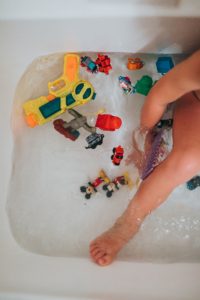When my daughter was a young toddler, we went through a phase where bath-times became a nightmare. Especially hair washing. It was so hard. She would scream, and cry, and hide, and refuse to let me wash her hair. And I would inhale deeply, try not to get frustrated, and try to reassure her that she was safe. “It’s going to be okay, just close your eyes, look up up up! Almost done… you’re doing great…” as I wrangle her flailing body and drench her with water. It wasn’t pretty.
Around the same time, my mother-in-law brought her some presents, one of which was a baby doll with a bathtub and little shower head. The mounds of kid toys and baby gear was ever growing, so this particular toy didn’t register for me for some time. Until one day, I saw her playing with it.
She was giving the baby a bath, and was placing her hand gently over the dolls face saying in her sweet, high-pitched toddler jabber “It’s okay, close your eyes!” as she pretended to bathe the baby and wash it’s hair. She was replaying a scary thing that happens to her, and trying to gain control over the experience.

I watched her from a distance go through this process, over and over, on and off for a few days. Then it was that dreaded time – it was time to wash her hair! We got ready for bath. She jumped in the tub like she usually does, and I let me know that we were going to wash her hair today. She said “Okay!” as she covered her eyes and looked up towards the ceiling. Just like that, she had resolved this challenge, on her own.
And this is the power of play.
Play is the natural language of children. Through play, they have an opportunity to explore their world, express themselves, and experience life. They have opportunities to make sense of and resolve difficult experiences, whether it be hair washing or something more traumatic.
Children generally show that they are having difficulty through their actions and behaviours. Children typically do not have the words to articulate their experiences, and so they do not talk out their problems like most adults might. Instead, they show their problems and challenges through their behaviours, and parents can often pick up on these. It may look like defiance, screaming and resistance like in my case above, withdrawal, isolation, inattention, fighting, avoiding, tantrums and so on.
Play therapy uses the natural language of children by providing a safe place with carefully selected toys (think “words”) to provide children an opportunity to express whatever may be bothering them. The play therapist is someone who is very well trained in this language of children, who can make sense of and understand what is happening for them without words. Play therapists know how to see and work with metaphors, which is how problems are presented, and guide the child towards naturally resolving whatever may be bothering them.
Play Therapy can help to:
- relieve stress
- enhance connections
- stimulate creative expression and exploration of problems
- develop a better understanding of feelings
- help regulate emotions
- express feelings so that needs can be better met
- reduce maladaptive behaviours
- increase self-confidence
I’m thankful that my daughter was able to show me first hand the magic that play can be.
I am so excited to begin the journey towards certifying as a Play Therapist and really learning this language. It was so far been a game changer for me, my clients, and their families.
To learn more about play therapy, you can check out this helpful article through our Canadian Association for Play Therapy (CAPT)
If you would like to learn more, please visit the page dedicated to play therapy here.
I would love to connect if you have any questions or want to know more about our services, including Play Therapy. You can contact us here




